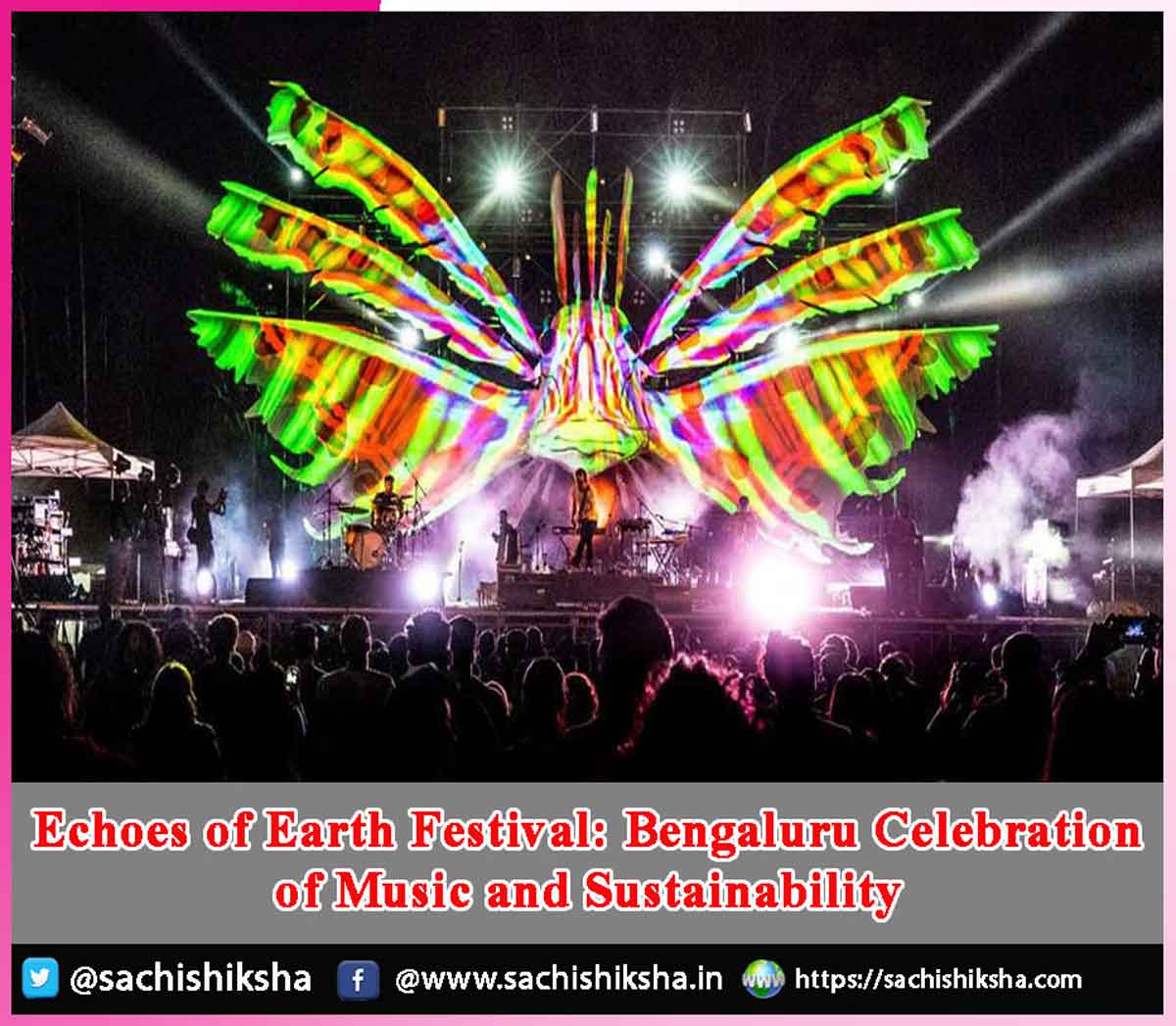Echoes of Earth Festival: Bengaluru Celebration of Music and Sustainability
Introduction: In a world where climate change, environmental degradation, and sustainability have become the key concerns of our times, cultural events are being increasingly used to address global issues. One such vibrant and unique festival that has gained significant attention for its blend of music, art, and environmental activism is the Echoes of Earth Festival held annually in Bengaluru, India.
Table of Contents
A Legacy of Sustainability and Music

Echoes of Earth stand as one of the few events that promote sustainability at its core, weaving environmental activism into the fabric of music, arts, and community. It is a reflection of Bengaluru evolving cultural scene, where music festivals are not only about entertainment but about creating spaces that generate important conversations and actions towards the future.
The Festival Experience
One of the most unique aspects of Echoes of Earth is its inclusive atmosphere. The festival has grown rapidly in terms of scale, yet it has retained its sense of intimacy. It’s a festival that brings together a wide spectrum of people—music lovers, environmentalists, families, and artists, all with a common interest in sustainability and enjoying the powerful art of music.
Venue: A Green Oasis in the Heart of Bengaluru
The festival is typically hosted at the Eco Park in Bengaluru, a location that resonates with the event’s core values of connecting with nature. This venue, surrounded by green spaces and open skies, offers an intimate yet spacious setting for visitors to experience music and culture in a naturally inspiring environment. Echoes of Earth go beyond just a typical festival setup, as the venue itself embodies eco-friendly principles. Recycling initiatives, the use of sustainable materials in construction, and efforts to minimize the festival’s carbon footprint reflect the festival’s commitment to green practices.
Music: A Global Celebration of Sound and Culture
An echo of Earth is primarily a music festival, and it showcases an eclectic mix of genres, performances, and artists from around the globe. The music lineup includes everything from electronic, indie, and rock to world music, jazz, and experimental sounds capes.
The festival also features performances that explore the relationship between music and the natural world. Artists are encouraged to create pieces that not only celebrate music but also engage with themes of nature, environmentalism, and human impact on the earth. This unique blending of artistry and activism creates a deeply meaningful experience for attendees.
The presence of eco-conscious musicians and performers makes the festival stand out. Many artists at Echoes of Earth use their platform to highlight the importance of environmental conservation. Whether through lyrics, visuals, or speeches, performers weave messages of sustainability into their sets. This concerted effort to raise awareness through music has been a defining factor in the festival’s success.
Workshops at Echoes of Earth span a wide range of topics that intersect with sustainability and environmental consciousness. These include workshops on waste management, composting, upcycling, renewable energy, and eco-friendly fashion. For festival-goers who are passionate about preserving the planet, these workshops offer valuable knowledge and tangible skills for a more sustainable lifestyle. Local environmentalists, activists, and experts often lead these sessions, creating a space for meaningful exchange of ideas.
Art installations at the festival also carry a message of sustainability. Often made from recycled materials, these installations showcase the creativity and ingenuity of artists who use discarded objects and found materials to craft thought-provoking sculptures and visual art. The installations are strategically placed throughout the festival grounds, allowing attendees to reflect on the environmental messages conveyed by the artworks while enjoying the festival.
Echoes of Earth actively invite community participation in creating these art pieces, reinforcing the idea that sustainability is a collective responsibility. Visitors often take part in creating murals, sculptures, and even musical instruments made from recycled materials, making the festival a hands-on experience for all.
Sustainable Practices: Beyond Music
A significant highlight of Echoes of Earth is its unwavering commitment to sustainability, which is evident in the festival’s operational approach. The festival strives to minimize its environmental footprint and sets an example for other events to follow.
Waste Management: A Zero-Waste Vision
One of the most prominent sustainable features of Echoes of Earth is its zero-waste policy. The festival organizers have designed systems to reduce the amount of waste generated during the event. Attendees are encouraged to use reusable water bottles, and composting and recycling stations are strategically placed across the festival grounds to ensure proper disposal of waste. The aim is to ensure that the festival’s impact on the environment is as minimal as possible, promoting responsible consumption throughout.
Food vendors are also required to use eco-friendly packaging, further reducing plastic waste. The festival has partnered with local sustainable food vendors that serve organic, locally sourced meals, promoting food security and supporting local agriculture.
Transportation and Carbon Offsetting
To reduce the carbon footprint, the festival actively encourages attendees to use public transportation or share rides when attending the event. Special shuttle buses are arranged from different parts of the city, providing an eco-friendly alternative to driving. Additionally, the festival has introduced a carbon-offset program where a portion of the festival’s profits is donated to environmental organizations focused on reforestation and renewable energy projects.
Eco-Friendly Merchandise
Even the festival’s merchandise is aligned with the sustainability message. T-shirts, posters, and accessories sold at the festival are made from organic materials or recycled fabrics. The festival also promotes the use of biodegradable items and reduces single-use plastics by offering alternatives like metal straws and paper cups.
Green Energy and Eco-Friendly Infrastructure
Echoes of Earth takes energy usage seriously. The event strives to reduce its reliance on fossil fuels by incorporating solar power and energy-efficient equipment for lighting and sound. The festival’s infrastructure, including stages, food stalls, and merchandise stalls, is built using sustainable materials like bamboo and recycled wood. The effort to source materials locally helps reduce the carbon footprint associated with transportation and shipping.
A Platform for Advocacy and Impact
At its core, Echoes of Earth is a platform for advocacy, where attendees can learn about critical environmental issues while enjoying world-class music. The festival hosts talks and panel discussions featuring environmental activists, thought leaders, and conservationists, who speak about various pressing topics like climate change, waste reduction, water conservation, and sustainable living.
The festival not only serves as a hub for entertainment but also as an active space for change. Many attendees leave the event with a deeper understanding of the environmental challenges the world faces and the actions they can take to reduce their personal carbon footprints.
An Echoes of Earth Festival has proven that festivals can be more than just celebrations of music; they can also be powerful platforms for environmental advocacy and sustainability. The festival stands as a shining example of how culture and creativity can unite people to address the most pressing issues of our time. In a city like Bengaluru, where urbanization and environmental degradation are becoming growing concerns, Echoes of Earth offers a beacon of hope—showing that through collective action and a commitment to sustainability, the planet can still be preserved for future generations.
Conclusion
As the festival continues to grow in both scope and influence, it is likely to become an even more important player in the global conversation about sustainability. By integrating music, art, and environmental activism, Echoes of Earth sets a new standard for what it means to be an eco-conscious festival, inspiring not only other festivals but also individuals and communities to act in ways that nurture the planet.













































